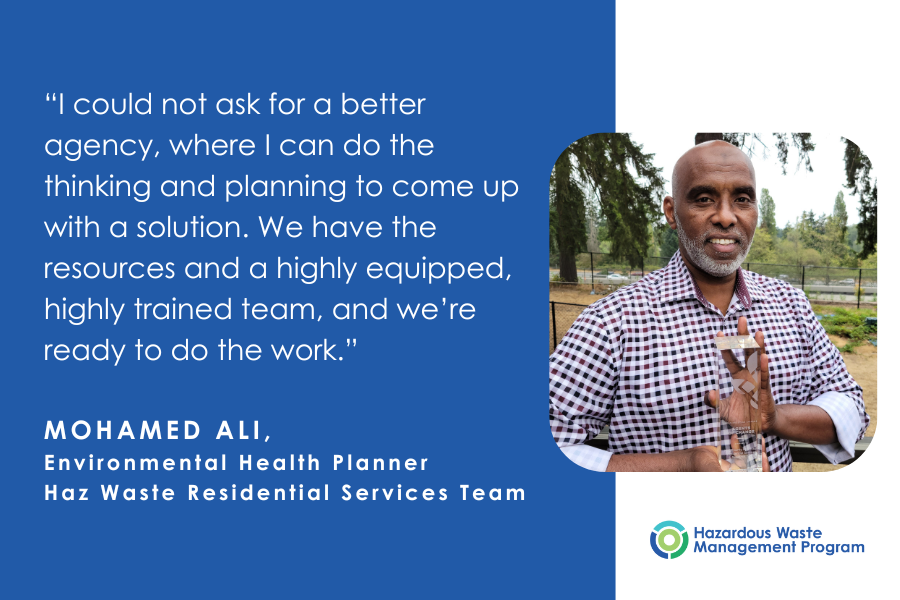Building bridges: How the Haz Waste Program harnesses experience and partnerships for greater impact
Meet Mohamed Ali, Environmental Health Planner

Mohamed Ali has always felt a calling to help others. As a Residential Services Program Manager at the Hazardous Waste Management Program in King County, helping people is at the center of everything he does.
“I could not ask for a better agency, where I can do the thinking and planning to come up with a solution,” Mohamed says. “We have the resources and a highly equipped, highly trained team, and we’re ready to do the work.”
So much of Mohamed’s desire and ability to contribute to the greater good is informed by his path in life – the places he’s been and the experiences he’s had. And the journey that brought him to King County and the Haz Waste Program is truly unique.
Mohamed grew up in the town of Jamaame, located on the southern coast of Somalia. When he reached college age, he left his hometown to attend university in Mogadishu, which is the largest city and capital of Somalia. However, his studies were interrupted in 1991 by civil war. To this day, Mohamed says the country where he was born and raised is resilient and continues to strive for peace despite ongoing challenges.
When conflict arose, Mohamed relocated to refugee camps in nearby Kenya. In spite of the many disruptions, he was determined to continue his education. Eventually, he resumed his studies in Nairobi, where his time at the University of Nairobi prepared him for postgraduate applications.
Mohamed would go on to earn a master’s in applied parasitology at Kenyatta University. Shortly thereafter in 1998, he immigrated to the United States and took at job with the Department of Immunology at the University of Washington School of Medicine in 1999. He went back to graduate school from 2006 to 2008, earning another master’s degree in global health at the University of Washington.
Mohamed’s biomedical research program at UW focused on T cell-mediated response to intracellular pathogens in vitro and in vivo. His motive was to be part of the solution for HIV, tuberculosis, and malaria – diseases that disproportionately harm people in eastern Africa. His interest in public health and disease prevention traces back to the part of the world where Mohamed came of age and witnessed firsthand the destructiveness of health care disparities. But, to his surprise, he has found his education and lived experience to be more than applicable here in Washington state.
“How health care is delivered (in the United States) was totally unexpected to me,” Mohamed says. “I was expecting the best health care system, and that everybody should be healthier. And now, I’m dealing with a lot of communal questions about people who moved from Africa, Asia, and Latin America – people who come here healthy, but the longer they stay, the sicker they become. That’s when I ask, ‘What's going on here? How is this happening?’
“That's the time that you tap into your past trainings and come up with, ‘What can I do here? How can I bridge into this?’”
Mohamed’s background in public health, science, and community engagement make him a perfect fit for his role at the Haz Waste Program. He works with the Program’s Residential Services team, which offers education, outreach, and technical assistance to help people to reduce their exposure to hazardous materials. In his role, Mohamed partners with local organizations like the Afghan Health Initiative and Mother Africa to inform members of the region’s immigrant communities about safer cleaning practices and lead poisoning prevention. He says these partnerships “drastically changed the way we do things.”
"In the past, when you have an inspector who goes out to a community with a different culture and who doesn't speak English, there were a lot of unanswered calls, and there’s a lot of cases that closed prematurely,” Mohamed says. “Then when we created these partnerships, things have changed completely, because we got someone who can do the calls and set up the appointments and take us to the homes. The Afghan Health Initiative partnership really has uncovered a lot of issues, including lead in cookware, in foods, and in traditional eyeliners.”
“We got the buy-in from the community with the support of that trusted community member that is going with us in the homes. So that is something, as a community engagement lead, we are really very proud of that,” Mohamed says.
Part of what makes Mohamed so effective in his work is his ability to relate to the people he helps. He knows what it’s like to move to a vastly different country, and that helps him earn trust in important ways.
“It's easier to understand where they're coming from, and the struggles they're going through, because you have been in that situation. And they share with you, because you have a lot of things in common,” Mohamed says. “While you are carrying a government badge, and you are managing something, you have to see where and be where the community is.”
It’s that community-focused perspective, along with his impressive professional expertise, that makes Mohamed so valuable to the Haz Waste Program. The Program strives to dismantle systemic barriers with an equity-focused approach, and Mohamed helps ensure that we can make meaningful impacts in communities most vulnerable to toxic exposures.
“I'm in the best place just to be part of the solution with our small agency,” Mohamed says. “The Haz Waste Program is doing great work compared to its capacity.”
 Translate
Translate